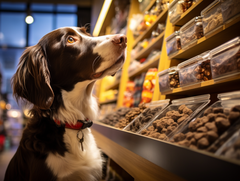Understanding your dog's gut health can be like cracking a code. With symptoms that are often subtle and easily overlooked, many pet owners may not realise their furry friend is sending out SOS signals from their digestive system.
In this article, we'll uncover the secret language of your dog's gut and how you can decode digestive issues for a happier, healthier pooch.
Spotting the Signs: How Your Dog's Gut Communicates
Your dog can't tell you when something's off, but their gut sure tries to. Ever noticed sudden changes in their stool?
Or perhaps a less-than-pleasant whiff in the air that wasn't there before? These could be more than just random occurrences; they might be coded messages from your dog's digestive system.
Stool Signals
A healthy stool is usually firm, moist, and easy for your dog to pass. If you start noticing any drastic changes—like diarrhoea, constipation, or even blood—don't ignore these signs. They're your first clue that something might be amiss in the gut department.
The Gassy Mysteries
Occasional flatulence is normal, but excessive gas could be a sign of an unbalanced gut. If your pooch is particularly pungent, it might be time to investigate their gut health.
Belly Noises and What They Mean
A quiet rumble is usually harmless and often occurs when your dog is hungry. However, loud belly noises coupled with signs of discomfort could be a red flag.
The Tell-tale Tongue
Believe it or not, your dog's tongue can reveal a lot about their gut health. A coated tongue may indicate the presence of toxins in the gut, often due to poor digestion or absorption of nutrients.
By becoming fluent in your dog's gut language, you'll be better equipped to identify potential issues and take timely action.
The Gut Flora: Your Dog's Invisible Allies and Enemies
The gut is home to billions of bacteria, some friendly and some not-so-friendly. Understanding this intricate ecosystem is crucial to decoding the messages your gut is trying to send.
Friendly Bacteria: The Good Guys
These are the bacteria you want to keep around. They aid in digestion, boost the immune system, and even produce essential vitamins.
When the good bacteria flourish, your dog is more likely to have a balanced mood and better overall health.
Unfriendly Bacteria: The Troublemakers
Contrastingly, harmful bacteria can wreak havoc if they become too prevalent. Symptoms can range from mild discomfort to severe digestive issues.
An overgrowth of bad bacteria is often a sign that your dog's gut needs attention.
The Role of Diet
What your dog eats has a significant impact on the balance of good and bad bacteria.
Ultra-processed foods and those rich in sugar and fats can encourage the growth of harmful bacteria.
On the other hand, a balanced diet rich in fibre and protein can help maintain a healthy gut flora.
Prebiotics and Probiotics
Prebiotics are non-digestible fibres that feed the good bacteria, while probiotics are live good bacteria that can be added to the gut. Including these in your dog's diet can be a powerful way to maintain gut health.
Antibiotics: A Double-Edged Sword
While antibiotics are useful for fighting off infections, they can also kill off the good bacteria in your dog's gut.
If your dog has recently been on antibiotics, consider a probiotic supplement to help rebalance their gut flora.
By understanding the types of bacteria that reside in your dog's gut and how to nourish the beneficial ones, you can take steps to improve their digestive health and overall well-being.
Common Digestive Issues in Dogs: Symptoms and Causes
Digestive issues in dogs are more common than you might think, and they can manifest in various ways.
Recognising the symptoms and understanding the underlying causes can empower you to take timely action.
Tell-tale Signs of Digestive Discomfort
- Frequent vomiting or regurgitation
- Diarrhoea or constipation
- Excessive gas and bloating
- Loss of appetite
- Lethargy or decreased activity
If your dog is showing one or more of these symptoms, it's time to consult your vet and delve deeper into their digestive health.
Food Sensitivities and Allergies
Food sensitivities can often be the culprit behind digestive problems. Ingredients like corn, soy, and certain proteins can trigger adverse reactions in some dogs.
Always check the food labels and be aware of any known allergies your dog may have.
Parasitic Infections
Gastrointestinal parasites like tapeworms and giardia can also cause digestive issues. Regular deworming and proper hygiene can go a long way in preventing such infections.
Emotional Stress
Believe it or not, dogs can suffer from stress-induced digestive problems.
Changes in environment, separation anxiety, or even a new addition to the family can cause stress, affecting your dog's gut health.
Sudden Changes in Diet
Switching your dog's food abruptly can lead to digestive upset. If you need to change their diet, do it gradually to give their digestive system time to adjust.
Understanding the symptoms and potential causes of digestive issues can help you take proactive steps to improve your dog's gut health. If problems persist, a visit to the vet for proper diagnosis and treatment is crucial.
The Role of Gut Microbiota in Digestive Health
The gut microbiota, a community of microorganisms living in the digestive tract, plays an integral role in your dog's health.
These microbes are involved in nutrient absorption, immune system function, and even mood regulation.
Importance of a Balanced Gut Flora
- A diverse microbiota aids in effective digestion and nutrient absorption.
- It helps in the production of essential vitamins like vitamin K and certain B vitamins.
- Balanced gut flora can prevent the overgrowth of harmful bacteria, thereby protecting your dog from various diseases.
Probiotics and Prebiotics: The Gut’s Best Friends
To maintain a healthy gut flora, consider adding probiotics and prebiotics to your dog's diet.
While probiotics are beneficial bacteria, prebiotics serve as food for these bacteria. Together, they create a harmonious gut environment.
Antibiotics: A Double-Edged Sword
While antibiotics can be life-saving, they can also disrupt the balance of the gut microbiota.
Always consult your vet about the necessity and duration of antibiotic treatments for your dog.
Decoding Digestive Issues Through Stool Analysis
Stool analysis is more than just a yucky chore; it's a diagnostic tool that can provide early warnings of digestive and even systemic issues.
Various factors can influence your dog's stool, from diet to bacterial infections, and understanding these can help you nip problems in the bud.
What to Look For:
- Consistency: A healthy stool is firm but not hard. Loose or watery stools can indicate digestive upset or something more serious like parasites.
- Colour: While brown is generally the norm, other colours can be alarming. Black can indicate internal bleeding, red could be a sign of lower gastrointestinal problems, and green might indicate gallbladder issues.
- Frequency: Changes in bowel movement frequency can indicate digestive issues. Too frequent may mean diarrhoea, while infrequent could point to constipation.
Lab Tests: Beyond the Basics
Sometimes, a visual inspection isn't enough. Lab tests can identify microscopic parasites, bacteria, and even blood not visible to the naked eye.
Your vet might recommend faecal flotation tests, antigen tests, or even faecal cytology depending on the suspected issue.
When to Seek Veterinary Help
Recognising Red Flags
While many digestive issues can resolve themselves with simple dietary adjustments, some symptoms should never be ignored. These include:
- Blood in stool or vomit
- Persistent diarrhoea or vomiting
- Lethargy and lack of appetite
Importance of Early Diagnosis
The digestive system is interconnected with other bodily functions, from the immune system to hormonal balance. Thus, digestive issues can sometimes be symptomatic of other underlying conditions. Early diagnosis can be crucial in treating these effectively.
Questions to Prepare for the Vet
To make the most of your vet visit, prepare to answer questions like:
- Has there been a recent change in diet?
- What symptoms have you observed and for how long?
- Does your dog have a history of digestive issues?
Tips for Maintaining a Healthy Digestive System
Diet: More than Just Kibble
A balanced diet is the cornerstone of digestive health. This doesn't mean just high-quality kibble. Fresh fruits and vegetables can provide the fibre necessary for healthy bowel movements.
Exercise: Not Just for Weight Management
Exercise isn't just for keeping your dog slim; it's also crucial for digestive health. Regular physical activity encourages a more active metabolic and digestive system.
Stress Management: The Overlooked Factor
Just like humans, dogs can suffer from stress-induced digestive issues. Maintaining a stable environment and routine can significantly improve your dog's digestive health.
Supplements: A Helping Hand
Sometimes, diet and exercise might not be enough, and your dog may require supplements like probiotics or digestive enzymes.
Conclusion: Listening to Your Dog's Gut Can Make All the Difference
With a little bit of observation and a lot of love, you can ensure that your dog's digestive system remains in peak condition. Because when it comes to your dog's health, every little sign counts, and the gut is as informative as it gets.




